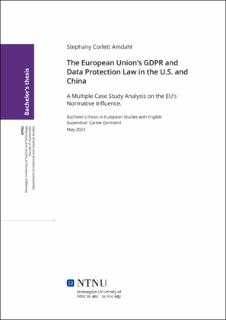| dc.contributor.advisor | Germond, Carine | |
| dc.contributor.author | Amdahl, Stephany Corlett | |
| dc.date.accessioned | 2023-06-21T17:19:46Z | |
| dc.date.available | 2023-06-21T17:19:46Z | |
| dc.date.issued | 2023 | |
| dc.identifier | no.ntnu:inspera:145530834:67759161 | |
| dc.identifier.uri | https://hdl.handle.net/11250/3072527 | |
| dc.description.abstract | I løpet av de siste tiårene har personvern blitt et betydelig problem på global skala. I 2016 vedtok EU en personvernslov kalt “General Data Protection Regulation” (GDPR) med formål å beskytte personopplysningene til europeere gjennom et komplekst og beskyttende reguleringsregime. Men, EUs GDPR har i tillegg påvirket interne bestemmelser, og jurisdiksjoner for personvern over hele verden.
På grunn av denne påvirkningen, inneholder denne fagteksten en sammenlignende analyse av EUs innflytelse på to personvernsparadigmer: “California Consumer Privacy Act” (CCPA) og “Personal Information Protection Law” (PIPL). Ved bruk av en saks studie analyse "Most different case study analysis", analyserer denne fagteksten hvordan og i hvilken grad EUs GDPR har normativt påvirket de to aktuelle lovgivningene. Sammenligningen er basert på fire punkter: (1) territorielt omfang, (2) viktige terminologier, (3) rettigheter for individer og (4) håndhevelse og straff. Avslutningsvis, legger fagteksten vekt på at EUs GDPR har fungert som en grunnleggende plan for CCPA og PIPL, men bare til den grad der interne interesser står parallelt med både de amerikanske og de kinesiske sine interesser. | |
| dc.description.abstract | Over the last decades, data privacy has become a major triggering issue globally. Therefore, in order to combat such a backdrop, the European Union (EU) adopted the General Data Protection Regulation (GDPR) in 2016. The regulation has as its main intent to safeguard the personal data of EU citizens via a complex and protective regulatory regime. However, the EU’s GDPR has impacted not only its internal provisions, but it has also managed to normatively influence other data-privacy jurisdictions worldwide.
For that reason, this thesis provides a comparative analysis of the EU’s normative influence on two data-privacy paradigms: the California Consumer Privacy Act (CCPA) and the Personal Information Protection Law (PIPL). By applying a Most Different Case Study Analysis, this paper qualitatively analyses ‘how and to what extent’ the EU’s GDPR has normatively influenced the two legislations in question. The comparison is based on four dimensions: (1) territorial scope, (2) key terminology, (3) data subject rights, and lastly (4) enforcement and penalties. Conclusively, the thesis notes that the GDPR has served as a foundational blueprint for both the CCPA and PIPL, however, only to the extent it parallels with the American and Chinese internal and external interests. | |
| dc.language | eng | |
| dc.publisher | NTNU | |
| dc.title | The European Union's GDPR and Data Protection Law in the U.S. and China: A Multiple Case Study Analysis on the EU's Normative Influence. | |
| dc.type | Bachelor thesis | |
